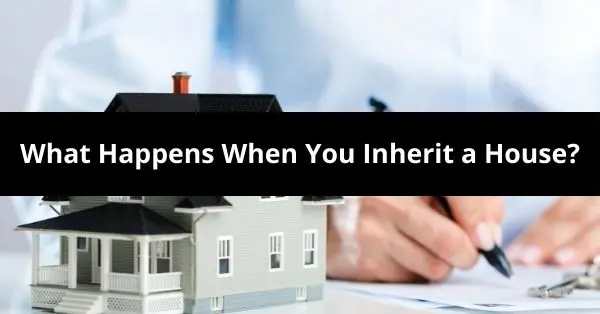There are three things that happen when you inherit a house. The first is that you go into probate, then once probate is settled you have to decide if you should keep the inherited house or sell it.
If you keep the inherited house you can turn it into a vacation home to create memories with family and friends, move in and live there, or you can rent it out and make a passive income. But inheriting a home can also add headaches to your life if the house is old and needs repairs. Inherited houses can also come with high property taxes, or require you to travel or hire someone for upkeep and maintenance. If you don’t want to deal with inherited home issues, then your best bet is to sell it.
If you’ve inherited a house and are stuck on whether to keep it or sell, this guide will help walk you through the pros and cons and we share tips on how to sell your inherited house if you decide to get rid of it. Before we get into that, lets start with the first step of inheriting a house, probate.
Probate is a legal process where the executor of the estate will hire a probate lawyer to go through the process of distributing assets. This process involves paperwork and court appearances. On average probate can take six to nine months to get everything settled. The good news is that probate gives you plenty of time to consider your options and decide what to do with the house you’re about to inherit.
Keep in mind, while the probate lawyer is sorting out everything, it is still your responsibility to make sure the bills are being paid like the mortgage, electricity, gas, and insurance. Your probate lawyer will provide instructions on how to handle paying the bills. Things like mowing the lawn and snow removal will need to be kept up, too, which is another reason why many people choose to sell inherited homes vs. living in them.
After everything has moved through the courts, and you officially inherit the house, what do you do next? You have three options.
The three options you have when inheriting a house include:
- Keep the house. Move into it or use it as a second home or vacation property.
- Sell the house. Walk away from the upkeep and maintenance of a second home.
- Rent the house. Use it as an investment property and bring in some extra income.
So what is the right answer? Below you will find questions and answers to help guide you.
FAQs About Inheriting a House
If you’re feeling overwhelmed, don’t! The FAQs below will help answer your questions about inheriting a house so that you can make the best decision based on your situation. This is an exciting time, not one to cause stress.
What happens if you inherit a house with a mortgage?
When you inherit a house with a mortgage, first you need to find out what kind of mortgage it is.
Ask the bank these questions:
- Is the mortgage assumable? If yes, you can do one of two things.
- Take over the mortgage of the inherited house. You will continue to make the payments on it until the loan is paid off.
- Sell the house. You can pay off the mortgage and then keep the rest of the money for yourself.
- Is it a reverse mortgage?
- If it is, you can’t transfer it to a new owner. The mortgage has to be paid once the owner passes away, which means either selling the house or getting a new mortgage in your name to pay off the existing mortgage.
- Is more owed on the inherited house than it is worth?
- In this case, a short sale might be your best answer. A short sale is when you sell a house for less than what is owed on it. Contact the bank – and a real estate agent experienced in short sales – to figure out your next step.
What happens if you inherit a house with a lien?
When you inherit a house with a lien, the lien on the property stays with the property. So, regardless of whether you decide to stay or sell, you have to pay off the lien. If you keep the home you will continue to pay the lien, and if you sell the house you will pay off the whole debt once you sell it.
Does a spouse automatically inherit the house?
Yes, most of the time a spouse will automatically inherit the house with or without a will. If you are the spouse check to see if both of your names are on the deed? If both of your names are on the deed, then the house is owned jointly and it will go to you when your spouse passes away.
If there is no will and your name is not on the deed then you will have a life estate property. You can live there, but you are not allowed to sell the property.
How does inheriting a house with a sibling work?
When you inherit a house with a sibling, you have a few options:
- Keep the home, and everyone can use it equally.
- Sell the house and split up the profits.
- Rent it out for extra income.
It would be great if everyone agreed on what to do with the house, but that doesn’t always happen. Your lawyer can help you navigate the options and choose what is best for you and your siblings.
What if one sibling wants to sell the inherited house and one wants to keep it?
When one sibling wants to sell the inherited house and another sibling wants to keep it, you can pay your sibling cash for their share of the house, and if they agree to sell they will sign the deed over to you. And if you don’t have the cash to pay for your share of the inherited house, you can get a mortgage for your half of the house.
Another option is to set up a plan with your sibling to pay them monthly until your share of the inherited house is paid off. Your sibling or siblings may like this option best since it will give them extra income each month.
Hopefully you can find something that works for everyone, but what if you can’t agree? You can go to court and have a judge put a third party in charge of selling the inherited house, and your lawyer can help guide you through that process.
How do you buy someone out of an inherited house?
You can buy someone out of an inherited house a few ways.
You can:
- Pay the other person cash for their share of the house. Then the person will sign over the deed to you.
- Get a mortgage to cover your half of the inherited house. The bank loans you the money to pay off your part of the house, and you now have a monthly mortgage payment.
- Set up a payment plan with the other person and pay them a monthly amount until you have paid off your share of the inherited house.
Can a person on SSI inherit a house?
Yes, a person on SSI can inherit a house, but it could affect your SSI benefits. The value of the home you inherit may put you over the limit for what you are allowed to have for SSI and make you ineligible to receive payments.
There are two ways to get around this.
- You can move in and make it your primary home.
- Your lawyer can set up a special needs trust, and the house will go into the trust. It’s important to note that the trust needs to be set up before the homeowner passes away.
If I inherit a house, is it taxable?
Yes, sometimes inheriting a house is taxable in the form of an inheritance tax. If you sell the property, you might have to pay capital gains tax. There is more information on these situations below.
Do you have to pay capital gains on an inherited house?
Yes, you have to pay capital gains tax on an inherited house only when you sell it (source). You pay taxes on the difference between the value of the home when you inherited it and what you sold the home for. Say the home was worth $200,000 when you inherited it, and then two years later you sold it for $225,000. You would pay capital gains tax on the $25,000 profit.
Do you pay an inheritance tax on a house?
The federal government does not have an inheritance tax, but some states do (as of December 2021). There are six states that have an inheritance tax.
States with an inheritance tax include:
- Iowa
- Kentucky
- Nebraska
- New Jersey
- Pennsylvania
- Maryland
The tax is a percentage of what the house is worth and is different for each state.
You don’t always have to pay the inheritance tax, even if the home is in one of these states. For example, spouses do not have to pay inheritance taxes. Children and grandchildren aren’t taxed if the person who passed away lived in New Jersey, Kentucky, Iowa or Maryland (though they will be in Pennsylvania or Nebraska).
All other relatives (that are not children or grandchildren) may have to pay taxes if the property is from any of the above states.
Should You Sell the Home You Inherited?
Yes you should sell the house you inherited if you don’t have the money to deal with the upkeep or ability to turn it into a profit generating business. If you do have the money to do these things, or the bandwidth to turn the inherited house into a business, then you should not sell the house.
If you decide to sell the house you inherited you have a few options. You could do an FSBO (for sale by owner), use a real estate agent that has experience in your market, or sell to a company like ours that buys houses for cash.
Now you know what happens when you inherit a house, the options you have to keep or sell, and the processes involved.


